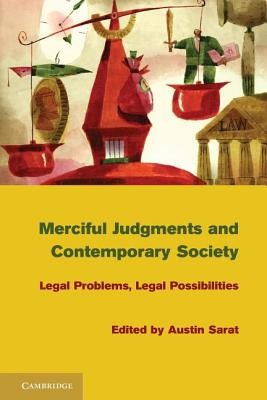
- We will send in 10–14 business days.
- Author: Austin Sarat
- Publisher: Cambridge University Press
- ISBN-10: 1107614325
- ISBN-13: 9781107614321
- Format: 15.2 x 22.9 x 1.7 cm, minkšti viršeliai
- Language: English
- SAVE -10% with code: EXTRA
Reviews
Description
Merciful Judgments in Contemporary Society: Legal Problems/Legal Possibilities explores the tension between law's need for and dependence on merciful judgments and suspicions that regularly accompany them. Rather than focusing primarily on definitional questions or the longstanding debate about the moral worth and importance of mercy, this book focuses on mercy as a part of, and problem, for law. Whether one starts from a worry about rules and discretion, about the attitudes of citizens and their leaders, or ways to undo the past, merciful judgments challenge and perplex, just as they help to sustain, our legal system. Charting these possibilities and problems is the work that this book seeks to do. Here we ask what challenges merciful judgments pose for law? When and why do those judgments encourage and nurture legal ingenuity and resourcefulness? When and why do they precipitate crises and breakdowns in legal authority? This book is a product of The University of Alabama School of Law symposia series on "Law, Knowledge & Imagination." This series explores the ways law is known and imagined in a diverse array of disciplines, including political science, history, cultural studies, philosophy, and science. In addition, books produced through the Alabama symposia explore various conjunctions of law, knowledge, and imagination as they play out in debates about theory and policy and speak to venerable questions as well as contemporary issues.
EXTRA 10 % discount with code: EXTRA
The promotion ends in 23d.15:36:36
The discount code is valid when purchasing from 10 €. Discounts do not stack.
- Author: Austin Sarat
- Publisher: Cambridge University Press
- ISBN-10: 1107614325
- ISBN-13: 9781107614321
- Format: 15.2 x 22.9 x 1.7 cm, minkšti viršeliai
- Language: English English
Merciful Judgments in Contemporary Society: Legal Problems/Legal Possibilities explores the tension between law's need for and dependence on merciful judgments and suspicions that regularly accompany them. Rather than focusing primarily on definitional questions or the longstanding debate about the moral worth and importance of mercy, this book focuses on mercy as a part of, and problem, for law. Whether one starts from a worry about rules and discretion, about the attitudes of citizens and their leaders, or ways to undo the past, merciful judgments challenge and perplex, just as they help to sustain, our legal system. Charting these possibilities and problems is the work that this book seeks to do. Here we ask what challenges merciful judgments pose for law? When and why do those judgments encourage and nurture legal ingenuity and resourcefulness? When and why do they precipitate crises and breakdowns in legal authority? This book is a product of The University of Alabama School of Law symposia series on "Law, Knowledge & Imagination." This series explores the ways law is known and imagined in a diverse array of disciplines, including political science, history, cultural studies, philosophy, and science. In addition, books produced through the Alabama symposia explore various conjunctions of law, knowledge, and imagination as they play out in debates about theory and policy and speak to venerable questions as well as contemporary issues.


Reviews